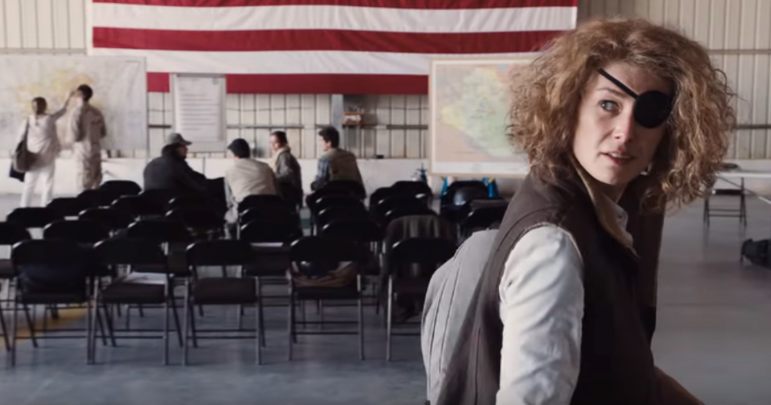Rosamund Pike’s performance as war journalist Marie Colvin in “A Private War” isn’t really in the running this awards season, and I have to assume it’s because she does something very difficult without calling attention to how hard she’s working, which isn’t how artists generally win prizes. This is a precise, even small performance by an actress playing a big character.
Colvin, who died in 2012 reporting on the siege of Homs in Syria, was an award-winning war correspondent who wrote for the Sunday Times. She lost an eye covering the civil war in Sri Lanka in 2001 and wore a stylish black eyepatch thereafter. She smoked and drank and cursed and otherwise carried on like her idol, the pioneering female war correspondent Martha Gellhorn. She wanted to have kids but never seriously tried again after she and her husband had miscarriages, but she loved international reporting so much that it never would’ve made sense for her anyway. All the death and destruction she witnessed gave her a case of Post-Traumatic Stress Disorder that worsened her already considerable drinking.
Pike, who hasn’t had a role worthy of her since she played Amazing Amy in “Gone Girl,” is magnificent. Pitching her voice low, and phrasing her lines in a way that recalls some of the great 1980s performances of Sigourney Weaver, she inhabits the character in such a way that we can imagine what it must have been like to know somebody as brilliant, mercurial, messed up and indispensable as Colvin, the kind of woman people can’t wait to tell stories about, even if they only talked to her once for thirty seconds. Her demise—in a rocket attack that was later believed have been a government-sanctioned assassination—is witnessed by her regular photographer, Paul Conroy (Jamie Dornan). Paul is an ex-soldier who idolizes her, understands her, and wants her to clean up, tend to her trauma, and try to be happy and grow old in peace—realizing, of course, that a woman like this can’t really be happy or at peace unless she’s running through rubble trying not to get shot and thinking about who she wants to interview next.
Documentarian Matthew Heineman (“City of Ghosts,” “Cartel Land“) and screenwriter Arash Amel don’t try to touch on every significant event in Colvin’s life, choosing instead to concentrate on her final years, starting when she lost her eye and ending with her death in Syria. There are no childhood flashbacks, no montages that I can recall, and very little background music for a movie about a heroic, troubled figure like Colvin. The supporting characters are a bit thin, aside from Conroy, but that’s probably to be expected given that the movie sticks close to Colvin throughout, and is mainly interested in her work and the effect that it had on her psyche. Stanley Tucci makes an appealing impression as her final boyfriend, Tony Shaw, even though he has few scenes and not much to do in them besides be self-effacingly sexy.
The movie doesn’t feel like a documentary, but it has obviously learned a lot of lessons from nonfiction cinema, including the willingness to stay in a moment until its dramatic potential has been exhausted, rather than constantly looking ahead to the next plot point. (About an hour into it, I realized that the cinematography reminded me of Oliver Stone’s first two films, “Salvador” and “Platoon,” then checked the credits and figured out why: it’s shot by the same person, Robert Richardson.)
Heineman obviously had a bit of a budget to play with, but there’s nothing ostentatious about the way the film has been staged and shot. When we see a vast panorama dotted with puffs of smoke or teeming with people, there’s a reason, and it’s not just about dazzling viewers with scope. The movie constantly looks for powerful moments and fleeting emotions, embracing the fragmentary or momentary nature of Colvin’s experience as well as her writing style. Her journalism was about telling the stories of ordinary people affected by war, rather than concentrating on big “gets” like Libyan dictator Muammar Gaddafi (whom she interviewed several times, the final instance occurring shortly before he was killed by his own citizens and laid out on a bloody mattress). I’m sure there are elisions, compressions and inventions in the script, but on first viewing it feels as if the movie is trying to be as raw as it can while still being credible as a Hollywood biopic. This isn’t a great movie, but it’s an honorable one, and true to the spirit of Colvin’s work, especially when it pauses to let civilians tell her their stories.












